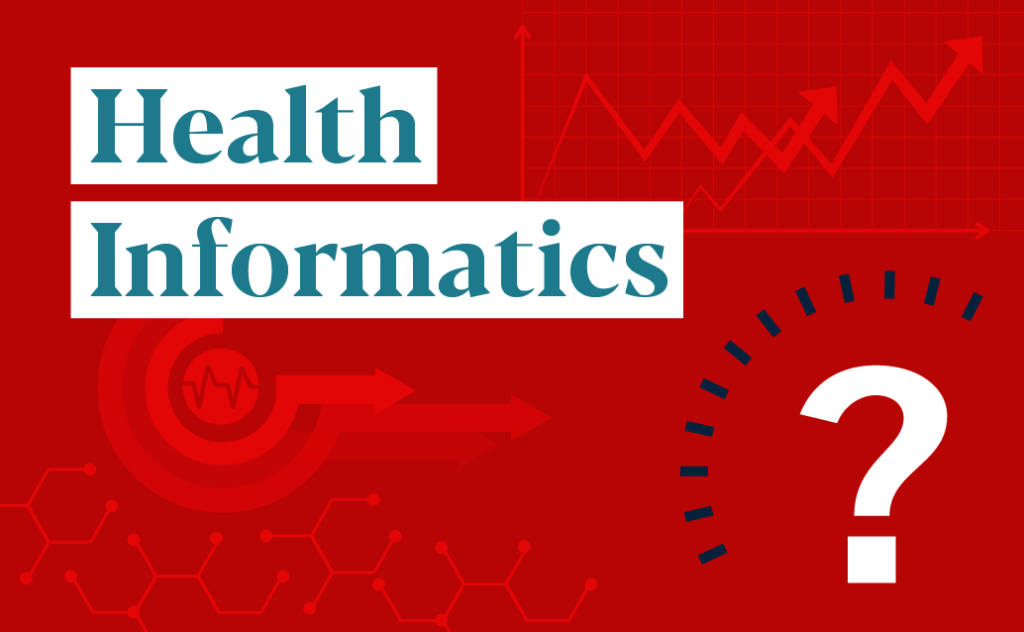
Just as in every other aspect of our lives, data plays a big role in today’s healthcare landscape. Health organizations need people who understand how to create systems that collect and maintain that data, as well as how to extract information from it to create actionable insights. This is where the powerful and comprehensive field of health informatics comes into play.
Health informatics is a unique arm of healthcare systems that synthesizes data analytics, data science and information management to collect, analyze and apply insights to improve health outcomes. Informaticists develop and evaluate systems that collect and use data to increase efficiencies in healthcare organizations and provide clinical decision support. The ultimate goal is to enhance healthcare services, lower costs and improve patient outcomes and population health.
Similar Fields to Health Informatics
Now that we’ve made an introduction to health informatics and technology, there are a few fields with similarities to health informatics. While they all seek to reach the common goal of human wellness, there are key differences to keep in mind. Health informatics actively seeks effective applications of biomedical data to generate scientific inquiry, problem-solving and decision making.
Health technology refers to the channels by which human wellness is accomplished like medicine, medical devices, assistive technologies or techniques and procedures. When brought together, health informatics and health technology encompass a collaborative and data-driven approach to achieving positive human health and quality of life.
Health information management mirrors health informatics in terms of its focus on data. However, it typically pertains to the organization, analysis and protection of health data. It’s also concerned with how that data is used. While health informatics may include that, it has the added scope of developing, implementing and evaluating the very systems used to collect and analyze that data.
How Health Informatics Professionals Make an Impact
Health informatics provides a unique opportunity to make a difference in healthcare and patient outcomes through the power of data. It directly coincides with efforts found in health technology and health information management, but it also contributes to and collaborates with areas including but not limited to clinical informatics, nursing informatics, health equity and public health.
- Clinical informatics: Clinical practice and health informatics marry to improve patient outcomes, advance clinical research and inform quality clinical decisions.
- Nursing informatics: Nursing data is used to illustrate successes and identify growth areas in hospitals, community health and home health environments.
- Health equity: Data-driven insights are invaluable when understanding marginalized and underserved groups, health disparities and health equity to generate accessibility outcomes.
- Public health informatics: Disease outbreak responses become more robust and successful when led by accurate, comprehensive data.
Pursuing a Health Informatics Career
In the early days of health informatics, many informaticists were administrators who were thrust into the role of supervising the development of a health information system or volunteered to create one. Since then, the field has matured and become more specialized, with many health organizations employing dedicated informatics and data science personnel. There are now undergraduate and graduate programs in health informatics, equipping those who wish to enter the field with the specific skills that health organizations are looking for through real-world coursework and relevant research.
Data and its impact on operations continues to play a larger and larger role in health organization operations. All of them are collecting tremendous amounts of data, and the organizations which collate and analyze it best will have an edge over those who don’t. They’ll have better operating efficiencies, which will translate to better cost savings and patient outcomes. To make such an impact, a healthcare informatics professional can benefit greatly from a master’s degree in healthcare informatics or a related healthcare field because it builds a strong career foundation and pathway to leadership.
Health Informatics Jobs
A master’s degree in health informatics is a solid credential for a wide variety of positions in the field. However, many health informatics professionals get Master of Healthcare Administration (MHA) degrees or Master of Public Health (MPH) degrees. Oftentimes, these types of programs include courses that provide specific health informatics skills in addition to more generalized healthcare leadership skills. American College of Education (ACE) offers an online MHA and MPH. Their MHA program includes a course on information systems and quality management systems. Similarly, their MPH program includes a course on public health informatics. Each of these avenues lead to a variety of health informatics roles like:
- Director of health informatics
- Healthcare informatics consultant
- Clinical informatics manager/specialist
- Health informatics specialist/analyst
- Senior health informatics and information systems advisor
- Healthcare informatics and reporting specialist
Growth Projections for Health Informatics
Health informatics is an exploding career field. Below is a quick look at the growth projections for key health informatics roles to see through 2033, according to the United States Bureau of Labor Statistics:
- Medical records specialist – 9%
- Health information technologist and medical registrar – 16%
- Health information services manager – 29%
Further, the field in general is one of the fastest-growing areas in healthcare, especially as it concerns utilizing data and leveraging health information technologies to make health education accessible. Health informatics is positioned beautifully to improve practice management and ultimately patient outcomes. Big data, simply defined as a large amount of data, is an impactful component of health informatics as it’s where decision-making and problem-solving emerge. Without this clinical data – comprised of electronic health records, electronic medical records and personal health records – health informatics professionals wouldn’t be able to impact healthcare delivery and overall improvements.
Determining if Health Informatics is for You
Deciding if health informatics is the field for you involves a few common and logistical considerations. You might think through education and experience requirements for roles you aspire to serve in. If you do need to further your education, you’ll want to ensure you’re willing to make the time and financial commitments required for certificate and degree programs. There are also median salaries to consider. Ensure that health informatics roles will help you meet your financial needs and goals.
On a more personal level, if you aspire to make a difference in healthcare through the power of data, you’d be a great fit. You also want to be inspired by multidisciplinary approaches that lead to positive patient outcomes, achieved through a variety of avenues like contributing to the technological advancement of healthcare. For example, health informatics professionals have led the charge for EHRs, where patient records are accessible through digital portals across health systems. Individual patients and providers alike are able to view results, messages, appointments and more. EHR platforms improve patient outcomes by providing wholistic information like immunization records, medication allergies, imaging, diagnoses and more to providers in an efficient way.
At the end of the day, health informatics offers a career field that allows individuals to contribute to invaluable patient health and wellness. You’ll have great opportunities to serve in unique and invigorating ways that serve the greater good, a job that you wake up excited for.
Equip yourself with the skills you need to excel in the field of health informatics. Explore American College of Education’s fully online healthcare programs.

